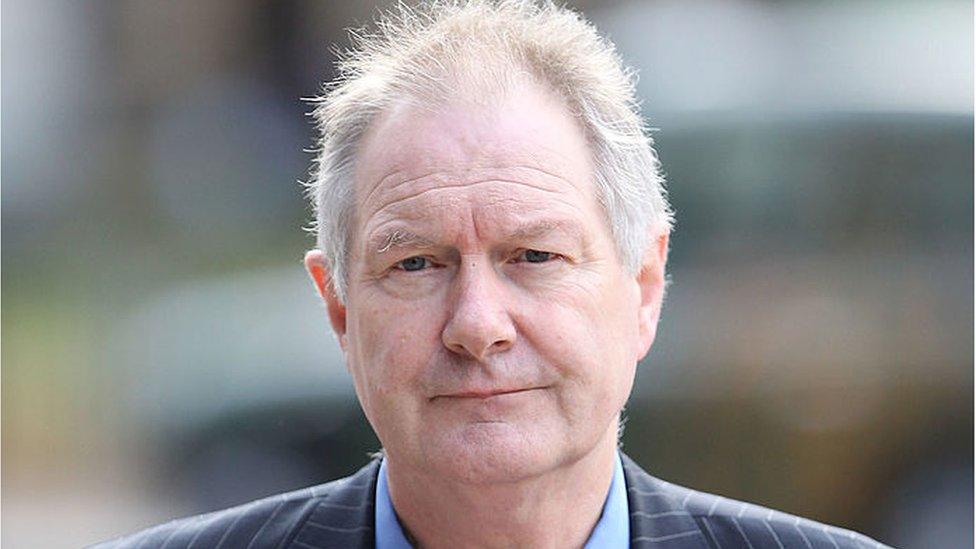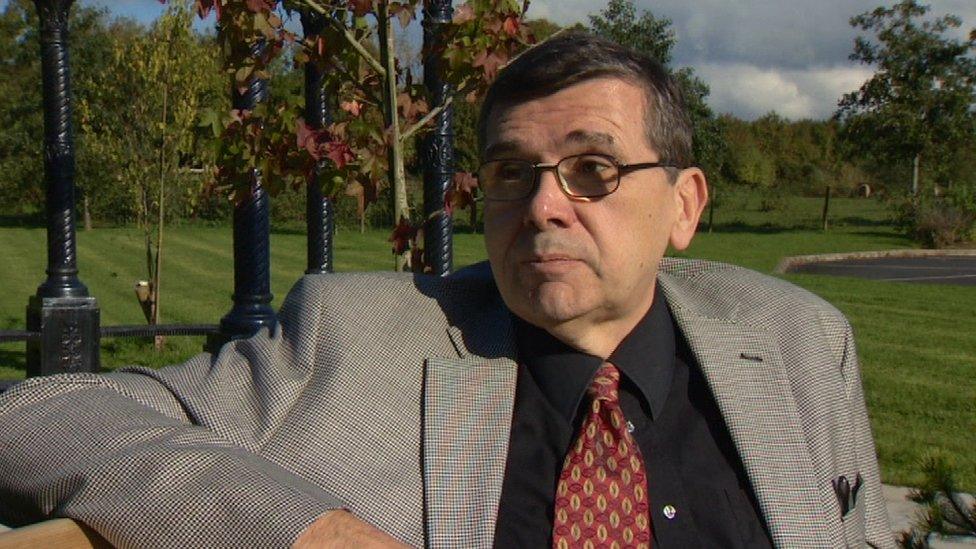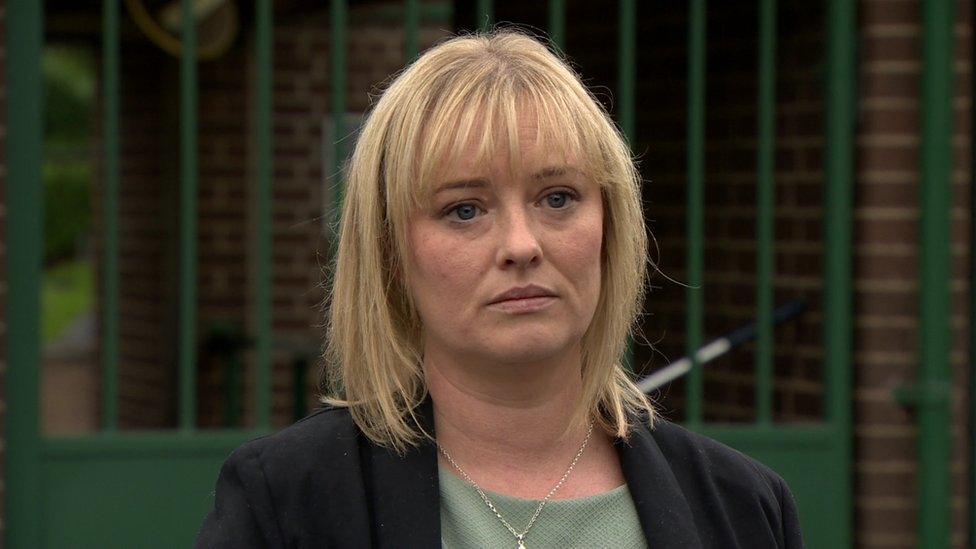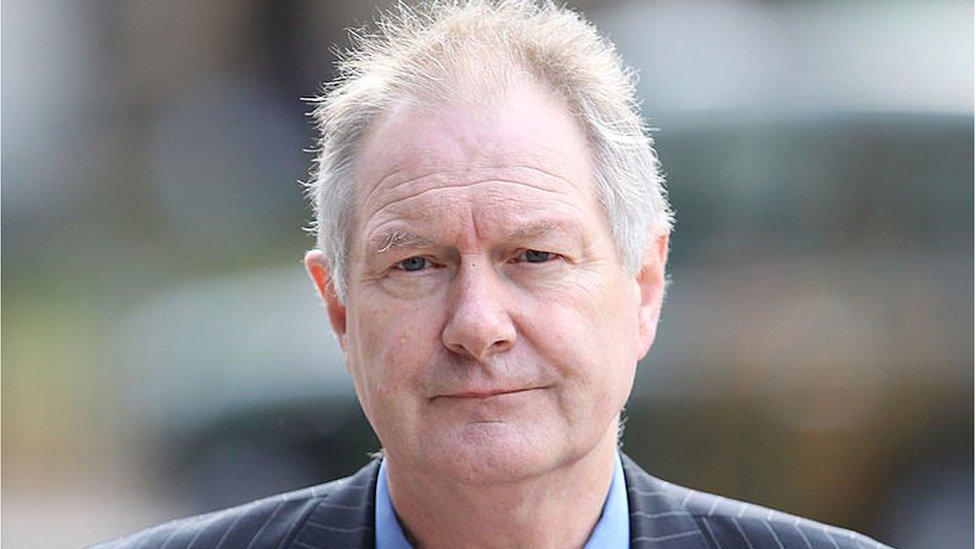Roy Greenslade: NI journalist's wife seeks answers over death threats
- Published

Roy Greenslade is a former editor of the Daily Mirror and was media commentator for The Guardian
The widow of a journalist who worked with Roy Greenslade has said she wants answers over what he knew about IRA death threats against her husband.
At the end of February Mr Greenslade revealed he supported the IRA's armed campaign, external while working as a journalist during the Troubles.
Kathryn Johnston said she had been left wondering if Mr Greenslade helped make her husband Liam Clarke a target.
Mr Clarke was told of an IRA plot to kill him in 1988.
At the time Mr Clarke, who died in 2015, was a senior journalist with The Sunday Times and Mr Greenslade was his line manager.
Writing in the British Journalism Review, external at the end of February, Mr Greenslade, a former Daily Mirror editor and Guardian media commentator said he was "in complete agreement about the right of the Irish people to engage in armed struggle".
Ms Johnston said the revelation had "knocked her senseless".
"If you've ever been threatened you know the fear, the anxiety, the guilt, the depression - it never really leaves you," she told the BBC's Good Morning Ulster programme.
"I was amazed by how much of the anxiety, almost a paralysing feeling, came back to me and I remembered all these strange little details," she said.
The BBC has contacted Mr Greenslade for a response.
'Last resort was to silence him'
"This all came up in 1988 which was a particularly rough year," Ms Johnston said.
"The IRA leadership was very anxious to find out and dam any leaks of information.
"Liam was an excellent journalist and he had a whole series of stories that gave the IRA leadership cause for concern.
"They tried to find out who he was talking to. They couldn't do that. So, they must have decided, eventually, that the last resort was to silence him."
She said when the family was told of the threat against him in October 1988, her husband's face "drained of any colour".
An anonymous phone call had been made to the family's home and the caller told Mr Clarke not to attend a meeting he had planned for the next day.
"He [Liam] just came into the living room and said: 'We've got to move out of the house tonight. Police are on their way to take us somewhere safe. The IRA have a plot to abduct and kill me tomorrow'," Ms Johnston said.
She said it was such a serious attempt the family could not return to their house in Glengormley, County Antrim, and the children could no longer attend their school.

Former Belfast Telegraph political editor Liam Clarke died in 2015
She said this was not the first time she has had questions.
"In 1995 Roy Greenslade wrote another piece, in which he implied that Liam was in thrall to security services, in fact, MI5, and he wrote this piece, based on conversations he claimed to have had with unnamed Irish journalists.
"It was malicious and full of wild allegations. For a journalist living, working in Northern Ireland to be accused of collusion with the security forces, is life threatening. It's appalling.
"How on earth could he have come upon a vicious unfounded take on a former very close colleague, that would once again put Liam, and all of us at danger," she added.
The family had to move again in 1996.
She said she had three questions for Mr Greenslade.
"Did he know in advance of the IRA threat to kill Liam in 1988?
"Does he agree that by concealing his allegiance to the IRA and support for the armed struggle that he was actually lacking in his duty of care to a colleague, whom he was directing out on stories to cover the Troubles and the peace process.
"Why in 1995 in The Guardian did he accuse Liam of involvement with British intelligence and endanger all of us again?"
'Finally allow Liam to rest in peace'
She said what she wanted was the uncertainty of what had happened to be resolved.
She said nothing could be worse than her "worst nightmares".
"I really want to sit down with him, in privacy, and have a conversation and I would love to think that I would get some answers about what happened in those days," she said.
She said such a conversation might "enable me to to put very unhappy torturous situation in my family's lives."
"I'd love to think that would finally allow Liam to rest in peace," she added.

Máiría Cahill described Mr Greenslade's article about her in The Guardian as "vile"
The Guardian has launched a "review" into articles concerning Northern Ireland written by Mr Greenslade and has issued an apology to Máiría Cahill who he had also previously written about.
He has also resigned from his post as a journalism lecturer at City University in London.
Mr Greenslade told the Press Gazette on Tuesday , externalthat he "did nothing more than the scores of journalists who keep their political views to themselves".
Related topics
- Published5 March 2021

- Published3 March 2021
